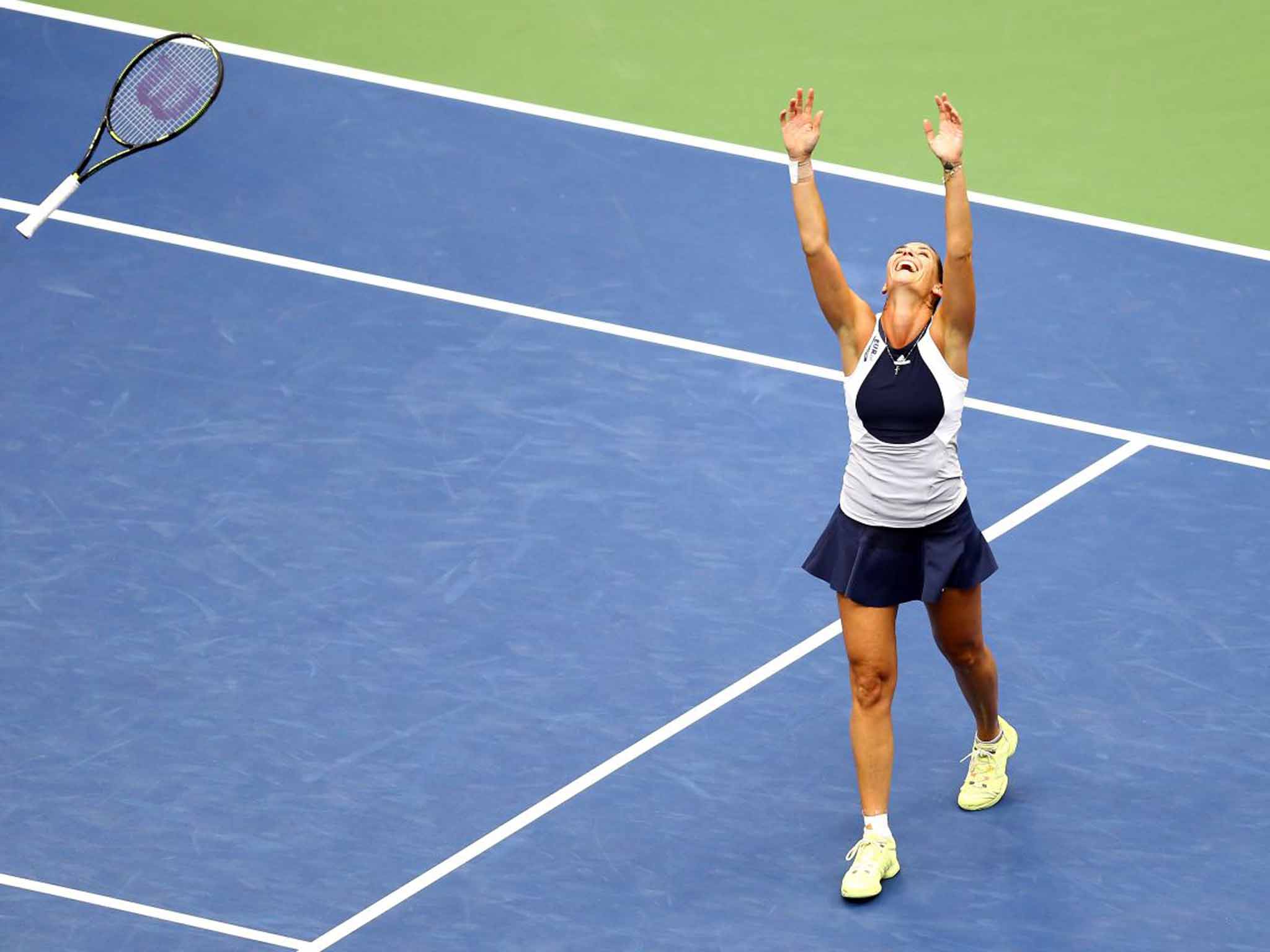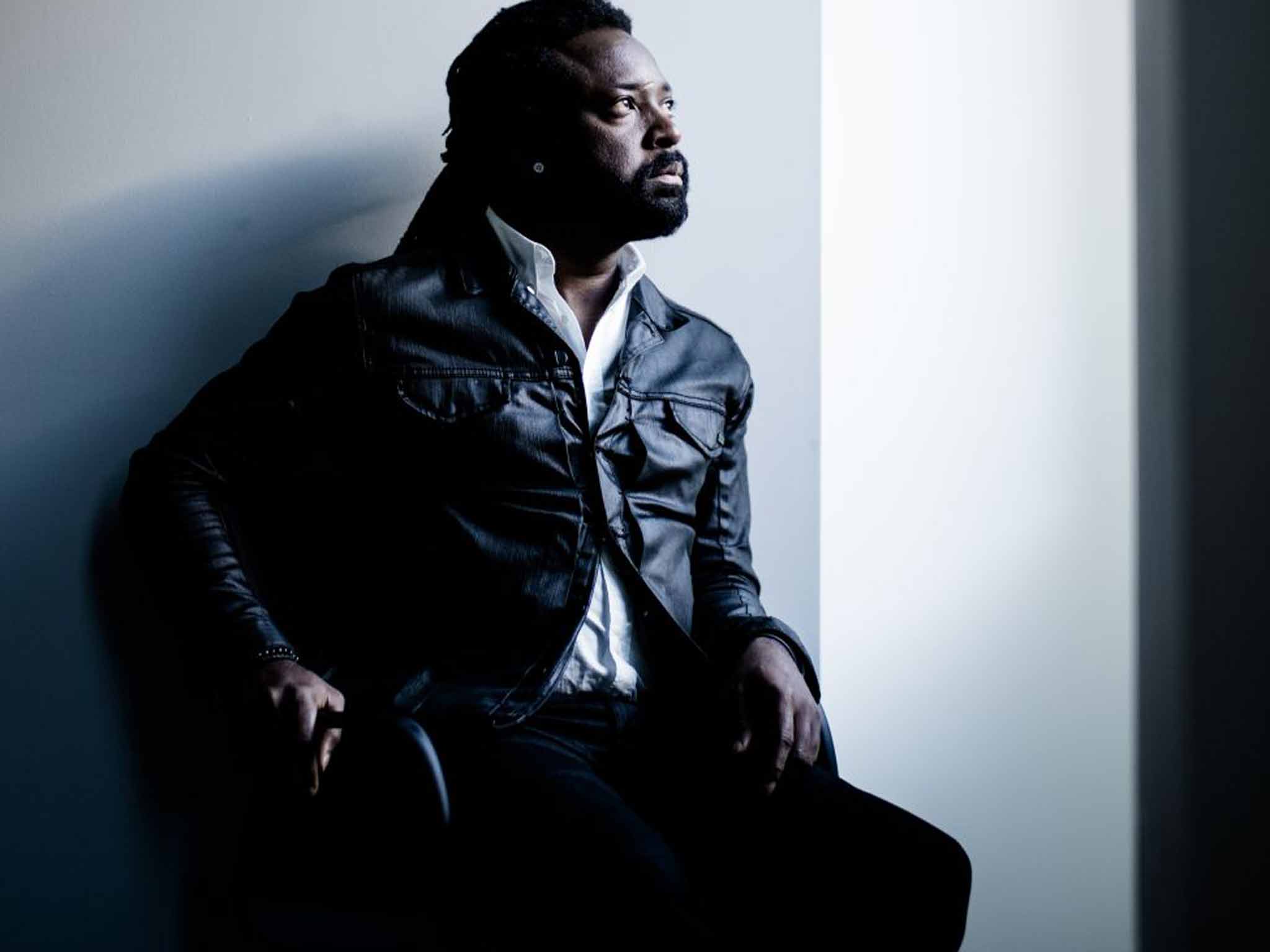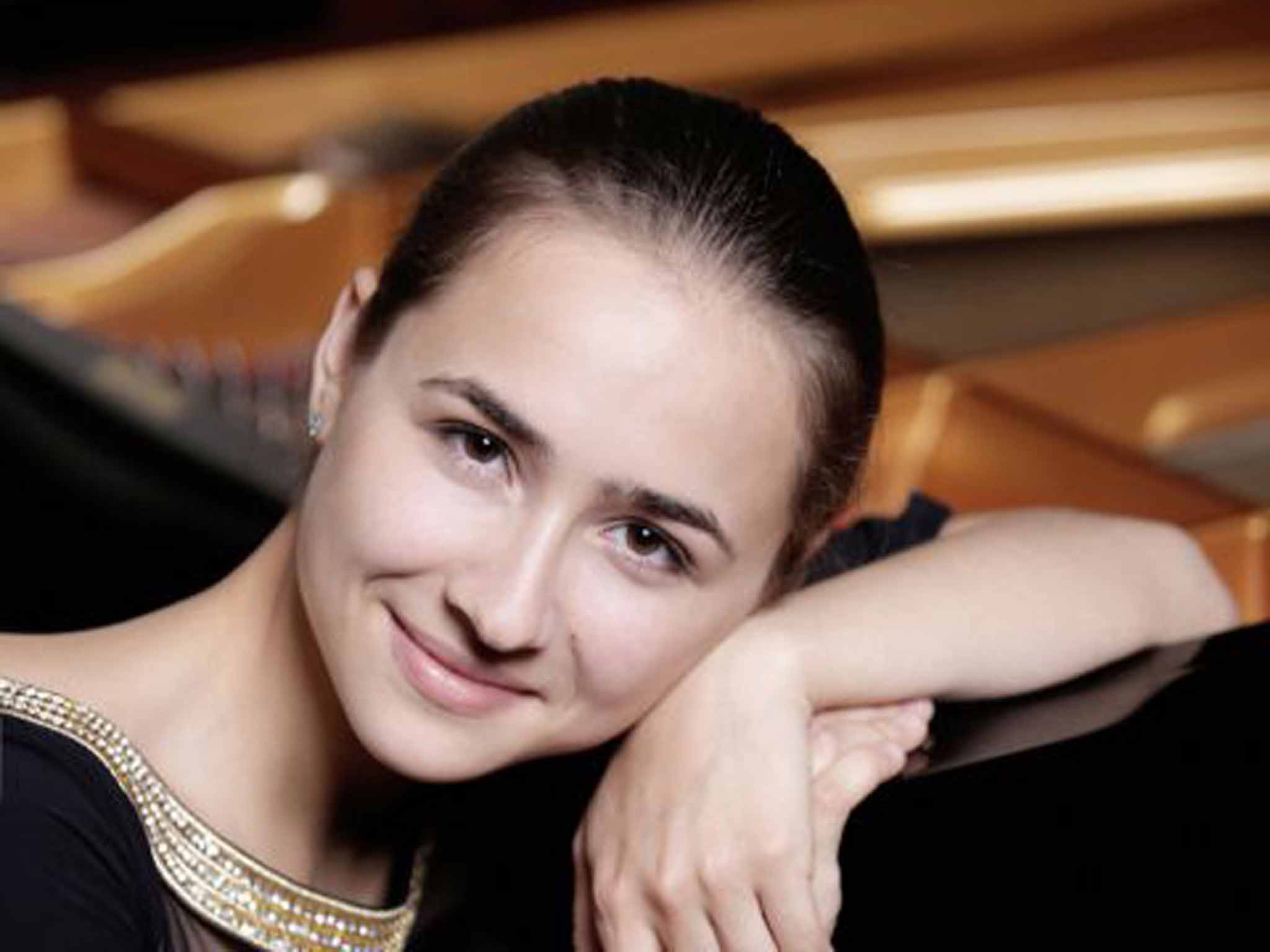Booker Prize, a BAFTA, the US Open: Six big 2015 winners on their moment of victory
What's it like to walk off with the top prize?

Your support helps us to tell the story
From reproductive rights to climate change to Big Tech, The Independent is on the ground when the story is developing. Whether it's investigating the financials of Elon Musk's pro-Trump PAC or producing our latest documentary, 'The A Word', which shines a light on the American women fighting for reproductive rights, we know how important it is to parse out the facts from the messaging.
At such a critical moment in US history, we need reporters on the ground. Your donation allows us to keep sending journalists to speak to both sides of the story.
The Independent is trusted by Americans across the entire political spectrum. And unlike many other quality news outlets, we choose not to lock Americans out of our reporting and analysis with paywalls. We believe quality journalism should be available to everyone, paid for by those who can afford it.
Your support makes all the difference.FLAVIA PENNETTA: WINNER OF THE US OPEN
The tennis world expected Serena Williams to complete a historic calendar-year Grand Slam of the sport's four biggest trophies at the US Open in September, only for Flavia Pennetta to pull off one of the sporting shocks of the year. The 33-year-old Italian won her first Grand Slam title by beating another outsider, her friend and compatriot Roberta Vinci, in the final. In her victory speech Pennetta announced that she would retire at the end of the year.
Life is unbelievable sometimes. When you want something really badly, you don't achieve it. Then when you think you have missed your chance and you relax and just try to enjoy things a little bit more, it happens. I think that was what happened to me in New York.
I played really badly in my last tournament before the US Open and I didn't go there with much confidence. I didn't even think about the possibility of winning until the quarter-finals. I just took one match at a time and with every round I felt a bit better.
Playing one of my best friends on the tour in the final was really difficult. I have known Roberta a long time. Of course in tennis terms it could have been much harder if my opponent had been Serena Williams, but this was mentally tough because I knew it was a fantastic opportunity to win the title.
The night before the final I was thinking I would not be able to sleep at all, but I managed five or six hours and that was enough. I was still nervous and didn't play very well at the start, but I began to improve after a few games.
Until I watched a replay of the end of the match I could not have told you what my winning shot was. I still don't remember what I felt or what I was thinking at that moment. I had been working on my "inside-out" forehand for a year or two without much success, but at last it came good just when I needed it.
The moment I remember most was when they presented me with the trophy. I can't explain how happy I was. I had always dreamed of that moment and I had seen so many other players enjoying that feeling, but in the end I had said to myself that it was not going to happen to me. When you actually have the trophy in your hand it's unbelievable.
My life has not changed much since I won, but I think it has changed the way people look at me. People are still stopping me in the street to say how happy they were for me. I saw it as a reward for all the efforts I had made over the years, particularly when I came back after suffering injuries. I never gave up. Maybe it was something that God gave me after I had worked so hard for so many years.
Interview by Paul Newman

MARLON JAMES: WINNER OF THE MAN BOOKER PRIZE
The Jamaican-born, US-based novelist won the Man Booker Prize in October for 'A Brief History of Seven Killings', his fictional tale of a murder attempt on the life of Bob Marley in 1976. 'Violent, polyphonic, masterful' was one critic's verdict. James, 45, is the author of two other novels, 'John Crow's Devil', and 'The Book of Night Women'.
When really amazing events like winning the Man Booker happen, the last thing you remember is how it feels. You're in a daze, you're without thought, you're shocked. I was most concerned with not stumbling and falling on the way to the podium.
I don't think things like that ever sink in, it always hits me off guard as kind of a shock that I won it. I don't know how you'd put winning an award in perspective, because then it sounds like you earned it. I'm stunned and I'm grateful but I don't think I'm entitled – no one's entitled to an award.
In Jamaica it made the front pages of both the newspapers and the Prime Minister mentioned it in her address to parliament. There used to be a time when only the British knew about the Man Booker. It is something the whole world knows about now. I've done interviews in India, I've had questions from Israel. It's an award that someone in Japan would have heard about, and it's sparked international curiosity – there's been an almost frenzy to sign foreign language rights.
I'm certainly not having the autumn I thought I was going to have. I thought there would be a tour for the paperback, hopefully I'd make an independent bookseller's bestseller list, read over my efforts, and then go after the next project. With winning the Man Booker you pretty much know the next year is changed irrevocably, in a great way.
It's also a lot of work and a lot of stress, but any time I start to think of complaining I just think that the Marlon James from five years ago would so have cracked to have these problems.
I think prizes are important for writers. Some of them can devolve into a popularity contest as with any prize but the fact is, if you're a literary author acclaim is the best selling point you have. For writers of tricky fiction, writers of complicated work, it's no different from an upcoming artist winning the Turner Prize.
I hope that more people are paying attention to what's happening in the Caribbean now. Because usually when we talk about Caribbean fiction we talk about the great novels of 20, 30, 50 years ago, despite the fact that people have been and are writing great work now. Who else is down there? Who else is in Barbados or Trinidad or Jamaica? Caribbean is more than Anglo. Who's coming up in Puerto Rico, in Dom Rep other than Junot Diaz? Who's coming up in Haiti other than [Edwidge] Danticat?
I don't think anybody should read anything, but I hope people read Seven Killings because on a basic story- telling level I think it's a good novel. But I also think one of the great highs about novels is that we get to realise that there's a whole world of people who went through a different year than you did, went through a different Cold War than you did, went through a different 1976, 1984 or 2001, a different 9/11 than you did. Reading is the easiest access to empathy we've got, and I hope my book helps play a role in that.
Interview by Sophie Morris

GEORGINA CAMPBELL: WINNER OF THE BAFTA TELEVISION AWARD FOR BEST ACTRESS
Past winners of the Bafta Television Award for Best Actress include Judi Dench, Helen Mirren, and Julie Walters. This year it went to 22-year-old Georgina Campbell – probably the least-known recipient in the award's history. She saw off competition from Sheridan Smith, Keeley Hawes and Sarah Lancashire with her portrayal of Ashley, a teenage girl who falls into an abusive relationship, in the BBC3 drama 'Murdered By My Boyfriend'. Campbell's career began when she was 17 and a director spotted her in the street.
I'd be a fool if I said I was expecting it. There were a couple of polls going around with who was expected to win and I was always incredibly far down with a very small percentage. I had one friend, I remember, who said, 'I think you're going to win it'. But even my family didn't think I would. My parents did that lovely thing that parents do of, 'we're so proud of you for getting to this point'.
When I was nominated, I had an initial sense of, I can do anything! But the closer it got to the day, the more ridiculous I thought I was being. When I got up to accept the award, I thought my mum was going to be furious because she'd been calling me all day and saying just write something, anything, so that if it does happen, you'll have something to say. And then, Sod's law, I ended up winning.
The night of the awards, I was genuinely a mess. I'd never been to a big event and, despite being an actor, I get quite nervous talking in front of people. After I'd collected the award, I had a bit of a panic attack. I didn't know what to do with myself. I think most of the famous people went off to luxurious after- parties. But I stayed behind with my little gang of people – a few people from the show and my agent – and we went for dinner and drinks.
It still hasn't really sunk in. It still feels really weird, really bizarre – but lovely. I took the award around with me at first. Now I have it on my windowsill. Everyone who comes around has a little feel of it. It's really very heavy.
Every now and then you get offered a role and think, I have to play this, and that's what it was like with Ashley. I felt strongly that I wanted to understand the character more. Career-wise, it's changed things in quite subtle, nuanced ways. It's not like winning the lottery and having things thrown at you left, right and centre. When you're acting, you're constantly trying to get one step ahead, up to the next level. What this has done is made me someone that some people have heard of. It's got me into a few meetings that I wouldn't have got into and people will be more likely to bring me in for auditions. But it's still the same game. If you're right for a role, you're right for a role, and if you're not, it doesn't matter if you've won an award, you're not going to get it.
Interview by Oscar Quine

ANNA TSYBULEVA: WINNER OF THE LEEDS INTERNATIONAL PIANO COMPETITION
Anna Tsybuleva is a 25-year-old Russian who in September won the Leeds International Piano Competition – widely regarded as the world's most prestigious competition for pianists under the age of 30. She studies in Basel and Moscow but has already embarked on a performing and recording career.
It was my first time in England and it was one of the most wonderful times in my life. The organisers really did everything for us and that helps you perform at your best. Competitors stayed in a student hall of residence but to practise I was able to visit someone's home – a lovely couple called Clare and John – and we have stayed friends. Between the semi-final and the final I spent the day at their home, enjoying their garden in very nice weather which I was told was unusual for Leeds at that time of the year.
I chose to try and enter Leeds because you have to perform such a variety of pieces, and I wanted the chance to show myself as an all-rounder. There were 70 pianists at the start of the competition and at no stage did I think about winning, not even when I got to the final. I just thought about what I was playing. The composers were chosen for us but we had some choice as to the actual pieces. We played solo pieces up to the final when the six of us who got through finally got to play with an orchestra. I knew straightaway what piece I wanted to play – Brahms's Piano Concerto No 2. Brahms is a musical father to me.
Three of us performed the first night of the final, and three of us on the second. I was the sixth and last performer. Was that an advantage? I don't know. You could say maybe not, that by then the judges must have been very tired. I didn't listen to any of the other performances. My professor advised against it. He said it might disturb my thinking about the way I was going to play. And when my time came it was just the most wonderful experience. I felt as one with the orchestra and I could sense how involved the audience was.
We had to wait an hour or so for the results and they were announced from sixth upwards. The last two competitions I'd been in I'd finished fourth, and I thought it might happen again. But the announcer went past fourth and I thought, oh. But even when the runner-up's name was announced, I still wasn't sure. I was thinking, maybe they are not going to award the top prize – that does happen sometimes.
I actually don't remember the moment my name was announced. I know it from seeing pictures of it afterwards. It was wonderful but I didn't really celebrate. I went with the other finalists back to where we were staying. It was about 1 o'clock in the morning and I remember feeling so hungry. We had sandwiches and tea. I was so excited I hardly slept that night. The trouble was, the next day we had to take part in a gala concert and that's when I felt under pressure, that as the winner I really felt I had to perform. I played some CPE Bach and some Saint-Saëns and I think it was OK.
I didn't have any family or friends with me. My mother Svetlana was the person who first taught me piano. She was a musician herself. But she died when I was 17, so there is just my father and my 11-year-old brother back home in Russia. Music helped me get through the loss of my mother. I talk to her through my music. I feel she is always with me. I think she is happy with me, I think she knows.
Interview by Simon O'Hagan
J.W. ANDERSON: WINNER FOR BOTH MENSWEAR AND WOMENSWEAR AT THE BRITISH FASHION AWARDS
Jonathan Anderson, 32, is the creative director of his eponymous label J.W. Anderson and the Spanish leather house Loewe, designing a total of eight collections of menswear and womenswear each year. In November, Anderson won the awards for both Menswear and Womenswear Designer Of The Year at the 2015 British Fashion Awards, the first time in the history of the awards that both accolades – the event's most prestigious – have gone to the same recipient.
I think because we'd won the Menswear Designer of The Year award in 2014, I did not expect it. If that makes sense? I'd gone into the event thinking, you know, when you're up against some very big businesses… It's the first time I've ever been in that mindset.
When they announced the Menswear award, I was very shocked, I was like, "Oh, we can be considered again!" It was a very odd experience. When I went up to get the trophy, I had nothing predetermined in my head of what I would say. I went backstage and the next thing was they called my name out for the Womenswear award.
My first reaction was: "You're kidding me!" It was very weird. When you're up there, you feel like the world is on top of you, all of a sudden: you're a needle, but they can see you in the haystack. You feel exposed. It was strange to win both. In an odd way, it actually is a very humbling experience. Because ultimately I do both menswear and womenswear, so I see it – for my team, and for myself – as an achievement of the balance of both. There's a balance of both genders.
Sometimes people's view of men's fashion is that it's lesser than women's – but there's never been a moment when men's fashion has been so important as today. We live in a period when it has become incredibly important to share, to learn from both men's and women's wear, and how they can help each other. So winning these two awards was kind of a landmark.
Ultimately, the achievement is to keep relevant, and to keep in business. Where I am now, J.W. Anderson is in growth mode, Loewe is in growth mode. It is important to keep the consistency of collections. We could drop below the radar: to prevent that is incredibly difficult. You've got to continue reassessing yourself. Next year is about consistency – keeping it up, getting the bags to grow for both brands, getting ready-to-wear to keep growing, tackling stores, tackling imagery.
It's better sometimes never to really realise where you are, because the minute you start to reflect on yourself, you end up missing where you're supposed to be going. Fashion is the worst for that: you can get very absorbed with where you stand in the world of fashion. So you get the award, you move on. You do the year, you move on.
What I find difficult about awards is that it raises the bar again. This is where you are, we're going to celebrate it. But in my head it's like, oh God, we have to outdo that, again. It's like saying, OK, you achieved this, but you now have to make your own goal of where to go next. You have to ask, how do you improve? I think that, in a way, is the best thing about awards. They force you to go, "I acknowledge what I've done, but it's not good enough. I need to keep going." The minute people think it's good enough, you need to do more.
Interview by Alexander Fury
PAUL MONAGHAN: WINNER OF THE STIRLING PRIZE FOR ARCHITECTURE
Paul Monaghan is a director of the architecture practice Allford Hall Monaghan Morris (AHMM), which won the RIBA Stirling Prize in October for the design of Burntwood School, a large comprehensive in Wandsworth, south London. The school, a modernist campus for 2,000 girls and 200 staff, was praised for its use of natural daylight, variety of teaching spaces and the integration of art into the design.
Buildings are vital for education. I'm a passionate believer that school buildings can make a difference, as well as the teachers. Together they make a big impact, from the most basic things like not overheating and not too much light, to comfort and the right scale of room.
Winning the Stirling Prize is incredibly important. For the school, and for the students who go there, to be in what was a very rigorous process and to then be voted the best building in the UK this year makes them feel very proud, and hopefully they feel inspired to work hard and achieve their dreams. It's also helpful in terms of putting good design and education on the map. There are various campaigns starting to think about how we can get better design into our buildings and maybe this will help along the way.
We have a government at the moment that doesn't seem to believe that buildings make a difference. They think that buildings should be entirely functional and that any civicness about them or anything that's aspirational isn't relevant, so we've lost political backing for supporting our schools.
The BSF programme, Building Schools for the Future [begun by Tony Blair and scrapped by Michael Gove in 2010], was a huge initiative to rebuild every school in the country. They got halfway, but the trouble is we've still got a terrible school estate. Why have badly designed schools when you can have well-designed schools? Good buildings don't cost any more than bad buildings. It's as simple as that.
We were quite overwhelmed to win the biggest prize in architecture. Our practice has been going for 25 years and the four of us have been working together since we were in our twenties. We've always believed that we could run a big practice, as we do, and create everyday buildings – not just art galleries but proper buildings that people work and learn in, and that these buildings could achieve the status of the Stirling Prize.
Interview by Sophie Morris
Join our commenting forum
Join thought-provoking conversations, follow other Independent readers and see their replies
Comments